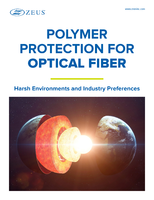Synthetic Rubber contains 20-25% bio-derived material.
Share:
Press Release Summary:
Based on epichlorohydrin monomer derived from palm and other vegetable oils, Hydrin® Elastomer helps lower impact on environment. Sustainable product is inherently electrostatic dissipative with dynamic properties ranging from damping to resilient, and broad temperature range of -40 to more than 125°C. Combining permeation resistance and hydrocarbon resistance, elastomer is suited for automotive hoses, air ducts, diaphragms, laser printer rolls, and vibration dampening devices.
Original Press Release:
Zeon Chemicals, L.P. Now Producing Hydrin® Elastomer with Bio-Derived Material
Quality and performance maintained with use of monomer
Louisville, KY — Production of a synthetic rubber that is both sustainable and reduces the dependency of fossil fuel is now in full force at Zeon Chemicals L.P.’s Hattiesburg, Miss. manufacturing facility. An epichlorohydrin monomer derived from palm and other vegetable oils is being used in the production of Hydrin® elastomers.
“Our R&D testing has been rigorous and every test has proven the monomer is chemically identical to our previous product, so the resultant polymers are the same,” said Clark Cable, Hydrin Business Manager. “Use of the monomer allows us to have a more environmentally conscious production, in accordance with our corporate social responsibility initiatives, because it contains 20-25 percent of bio-derived material.”
“In the chemical production environment, we have to constantly seek new methods and materials for our customers that help lower our impact on the environment. Because we are reducing our usage of refined fossil fuels with this monomer — without sacrificing any product quality — we are able to reduce our carbon footprint. That makes Hydrin an exceptional choice for our end users,” added Sam Harber, senior applications development chemist.
Specific characteristics of the Hydrin line include:
• Broad temperature range, from -40°C to >125°C continuous; >150°C short-term
• Range of dynamic properties - Damping to resilient
• Inherently electrostatic dissipative
• Very permeation resistant to gases - Exceeds butyl in most instances
• Hydrocarbon resistant - Fossil and bio-fuels
With the unique balances of temperature, permeation and fuel resistance, Hydrin is used in a wide range of applications, such as automotive hoses, air ducts, diaphragms, laser printer rolls and vibration dampening devices.
About Hydrin®
Zeon Chemicals L.P. offers ECO polymers from three different classes of polyepichlorohydrin: CO (homopolymer), ECO (copolymer) and GECO (terpolymer). Each type is available in several ranges of Mooney viscosity. Each has the capability to be blended with the other for property enhancement. Blending can also be done with other elastomers so long as the cure sites are compatible.
About Zeon Chemicals L.P.
Zeon Chemicals L.P. is a wholly owned subsidiary of ZEON Corporation of Tokyo, Japan, a world leader in specialty elastomers, polymers and specialty chemicals. ZEON Corporation is one of the top producers of polymers in the world with plants in Asia, North America and Europe, and Research and Development laboratories in Kawasaki (Japan), Louisville (Ky., USA) and Barry (UK).
Headquartered in Louisville, Ky., Zeon Chemicals is the leading producer of specialty elastomers in the USA. It produces Nipol® NBR, HyTemp® ACM, Hydrin® ECO, Zetpol® HNBR, and Chemisat® Latex, which are used in the manufacture of hoses, seals, gaskets, belts and other parts for automotive, industrial, oil field and printing markets. Customers are served from plants in Louisville (Ky., USA), Hattiesburg (Miss., USA) and Bayport (Texas, USA).
With combined sales of US $3 billion, ZEON Corporation utilizes its expertise and basic position in C4 and C5 chemistry to offer a wide range of products. The company employs approximately 2,800 people worldwide.




